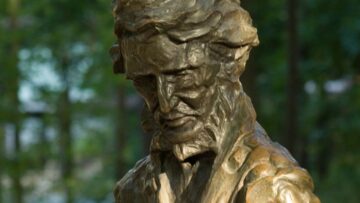Costica Bradatan in the TLS:
 On July 4, 1845, a man from Concord, Massachusetts, declared his own independence and went into the woods nearby. On the shore of a pond there, Henry David Thoreau built a small wooden cabin, which he would call home for two years, two months and two days. From this base he began a philosophical project of “deliberate” living, intending to “earn [a] living by the labor of my hands only”. Though an ostensibly radical undertaking, this experiment was not a break with his past, but the logical culmination of years of searching and groping. Since graduating from Harvard in 1837 Thoreau had tried out many ways of earning his keep, and fortunately proved competent in almost everything he set his mind to. Asked once to describe his professional situation, he responded: “I don’t know whether mine is a profession, or a trade, or what not … I am a schoolmaster, a private tutor, a surveyor, a gardener, a farmer, a painter (I mean a house-painter), a carpenter, a mason, a day-laborer, a pencil-maker, a glass-paper-maker, a writer, and sometimes a poetaster”.
On July 4, 1845, a man from Concord, Massachusetts, declared his own independence and went into the woods nearby. On the shore of a pond there, Henry David Thoreau built a small wooden cabin, which he would call home for two years, two months and two days. From this base he began a philosophical project of “deliberate” living, intending to “earn [a] living by the labor of my hands only”. Though an ostensibly radical undertaking, this experiment was not a break with his past, but the logical culmination of years of searching and groping. Since graduating from Harvard in 1837 Thoreau had tried out many ways of earning his keep, and fortunately proved competent in almost everything he set his mind to. Asked once to describe his professional situation, he responded: “I don’t know whether mine is a profession, or a trade, or what not … I am a schoolmaster, a private tutor, a surveyor, a gardener, a farmer, a painter (I mean a house-painter), a carpenter, a mason, a day-laborer, a pencil-maker, a glass-paper-maker, a writer, and sometimes a poetaster”.
From this position, with any number of routes before him, yet none decided on, Thoreau was particularly well placed to consider questions about the nature, purpose and fundamental meaning of work.
More here.
